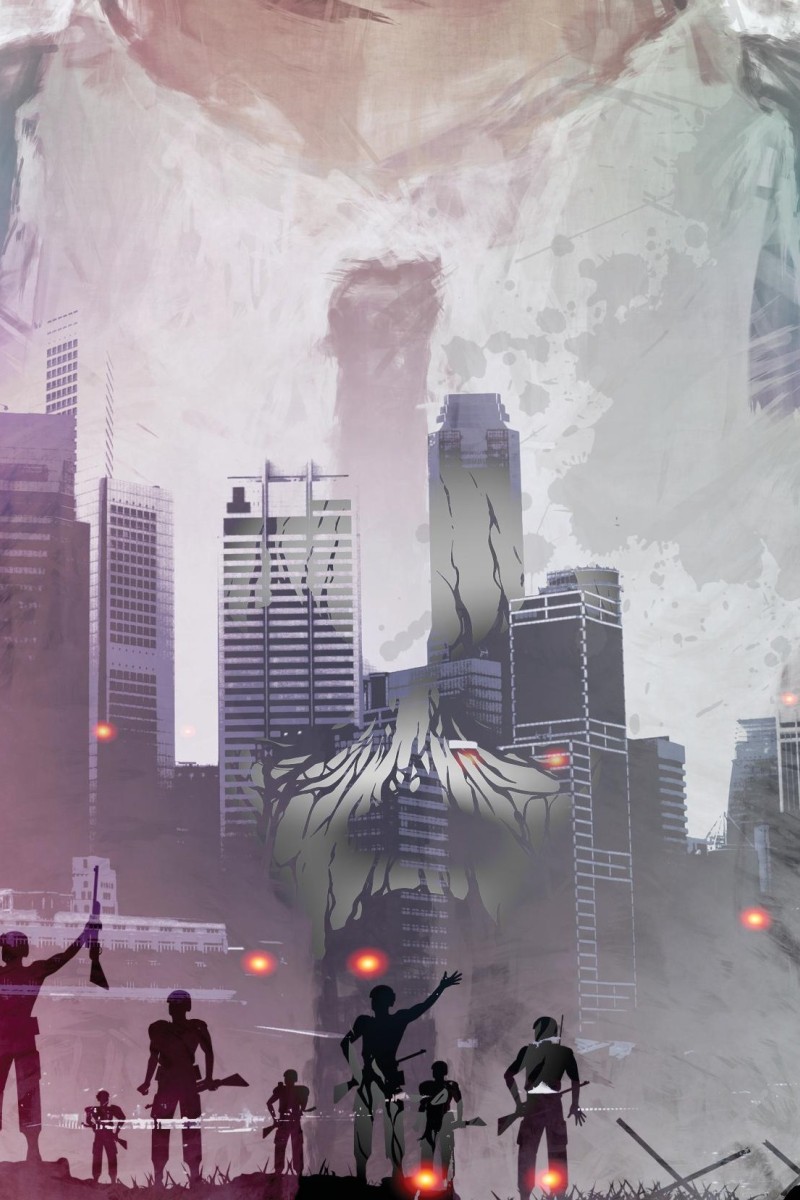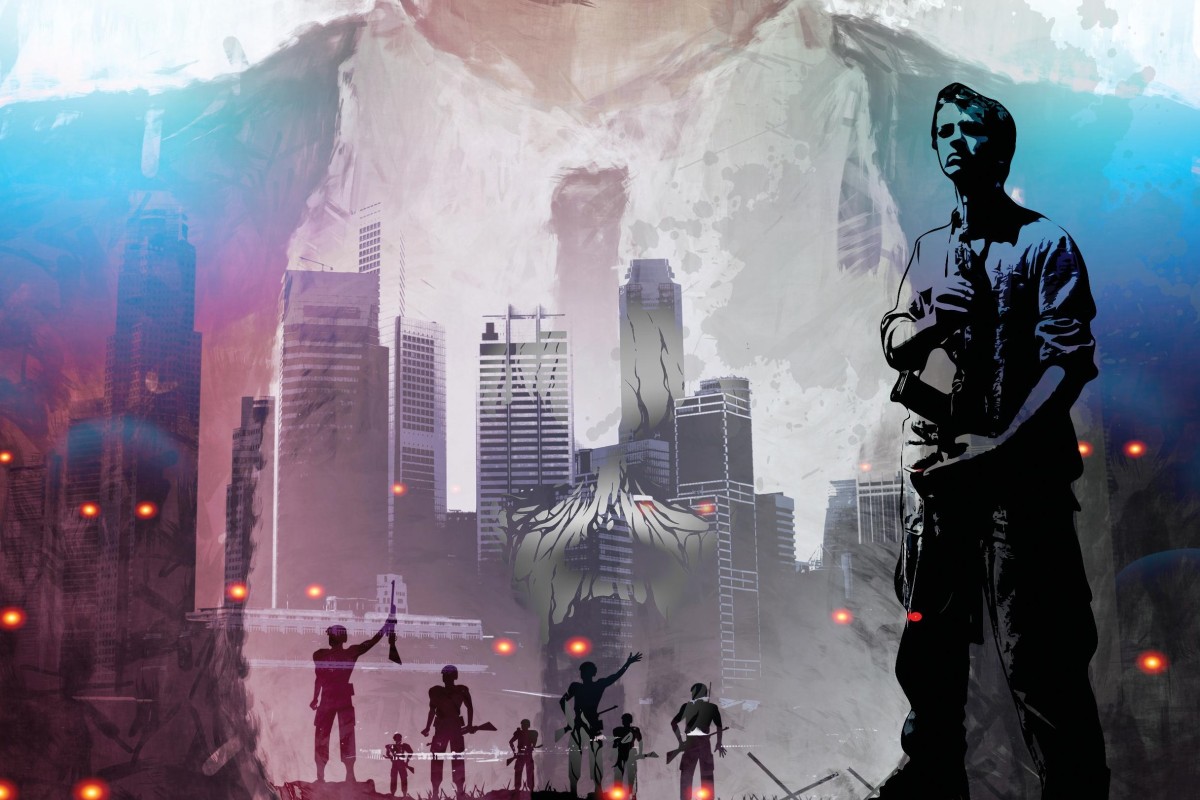
2018 Summer short story: Preparing for the battle to take back Hong Kong
In a hopeless future Hong Kong, a student discovers he has closer ties to an underground movement than he thought

This story was written by Abhay Venkitaraman, a 15-year-old student from King George V School.
He is one of the finalists of Young Post’s 2018 Summer Short Story Competition. Each week during the holidays, we will publish one of the finalists’ stories. Our favourite entries will be compiled into a book which each finalist will receive a copy of. The winning entry will be published in Young Post on August 25.
BANG! The loud sound startled me awake, nearly bursting my eardrums. As I fumbled for my glasses, the only thing I could feel in my cold, dark room was the crawling of the termites that had infested my bedroom 10 days ago.
I jumped off my creaky mattress. I was anxious to see what had happened. Bedbugs clung to me, and I brushed them off with what energy I had left in my starved, sleep-deprived body.
I decided to take a look outside.
As soon as I opened the dilapidated steel door leading out of my flat, I felt a sharp pain in my right leg. I looked down – a metal shard from the door had broken the skin, and blood dribbled down my leg. The pain intensified; it felt like it was burning me to my very core. I bit my lip and trudged to the medicine cabinet. I needed to find some ointment – if the wound became infected, then that would be it for me.
When I opened the cabinet, though, the only thing I found was an upturned bottle of cough medicine, and dead insects scattered like grains of uncooked rice. I closed the cabinet. Even that was broken – the hinges acted like the joints of an old man: worn, and prone to buckle at any given moment.
People were still shouting. I needed to know what was going on. There was nothing I could do about my wound anyway.
Limping past the termite-infested tomes, deflated footballs, and photos of my long-lost parents in my room, I managed to get myself to the door again and, with a heave,
I launched out of my house.
Outside my doorstep, I saw a mass of people wailing at the tops of their voices. I tried to shove my way to the middle of the crowd, but it was so big, it took me about a minute to reach the centre.
And then I saw it. And it chilled me to the very core.
A body lay at the centre of the circle, bullet holes peppering it until it looked like a sponge. Pools of blood poured out of it, like an overflowing river, mixing with the cranial fluid that gushed out of its skull. The intestines were spilling out, too, and, like a staring competition, I didn’t feel as if I could look away.
I was overwhelmed by waves of disgust, and I dropped to the ground like a sack of flour, where I could feel the gore seeping into my clothes, onto my skin.
I didn’t care about that – I had seen something I couldn’t unsee. I had touched something I couldn’t un-touch.
Lying on the ground … was one of my classmates.
***
It had been about five days since the incident, and I had a day off from school. It was, in fact, the first day off that I’d had in six months, and it felt good not to have propaganda shoved down my throat for 15 hours at a time.
I had managed to grab a copy of the Hong Kong News Digest, which was the only newspaper available in Hong Kong. All the others had been banned a long time ago. The government had always said that they believed in the “values of the free market and competition”. Ironically, the only thing that was exempt from that was the truth.
The digest was full of the usual government and business-friendly propaganda. Ten pages later, I was about to put it down when something caught my eye.
Tucked away in a tiny corner of a page was a story titled “Radical revolutionary shot in poor neighbourhood”. A photo came with the headline and, when I looked at it, I realised I knew who it was.
It was him. It was the student whose body I had seen a few days ago. I was instantly taken back to that moment and pangs of nausea roiled in my gut.
I forced myself to read the article anyway. It was the right thing to do, to honour the boy’s life.
According to the article, he was a member of the United Worker’s Party, or UWP, a large group of trade unions and revolutionary parties. A few years ago, it contained more than 100,000 members but, as the city’s government tightened its laws on freedom of speech, it had purged organisations that it deemed dangerous – arresting, imprisoning, and even executing people without trial. The UWP had been classified under that category, and it had been destroyed.
I was surprised to see that he been a group member. But … maybe he wasn’t. After all, this could’ve just been a crime committed by a corrupt police officer, and in naming the UWP, the government was attempting to cover it up.
***
My daily trudge to school each morning lasted about an hour. Sometimes, you could see the sun rise, and its fiery glow would illuminate the shiny exteriors of the huge government offices that flanked Nathan Road. Unfortunately, they were the only things that were ever shiny in this part of
the city.
The road used to be famous for its small businesses and family restaurants. In fact, my parents used to own a small pharmacy here. But, just like so many others, they lost customers to the multinational corporations that moved in, and had to close down. This meant that unemployment was rampant – there were often lots of beggars on the streets, their empty palms wide open and their faces scrunched up in agony.
The road today, however, was emptier than usual. The masses travelling from their flats to their workplaces were significantly less dense. I began to feel like something was wrong.
Suddenly, a Jeep careered around a bend and zipped across the road. I could feel the ground vibrate as the vehicle came to a screeching halt in front of me.
Two heavy-looking, balaclava-wearing men jumped out, grabbed my shirt, and tossed me into the back seat. I tried my best to get to the car door, to escape, but my efforts were fruitless. They were twice my size – I could do nothing. I ran out of the energy needed to resist.
One of the men forced a piece of cloth onto my face. As I breathed in, my vision faded, and I slipped out of consciousness.
***
Light. I could feel it hitting my face. I opened my eyes, and I slowly got up from where I was lying. I took in my surroundings. I was in a rectangular room coloured in shades of red. Revolutionary slogans were scrawled across the walls, graffiti-style.
Where was I?
I heard a door creak open behind me. I turned around, and I saw a muscular, sharp-jawed woman in military dress.
“Good evening,” she said gruffly. “I’m General Zhang, the commander of the United Worker’s Party.”
“It still exists?”
“Yes, indeed,” she replied. “After the government purged its opposition, we were forced to go underground. We made it look as if we had disbanded but we are, in fact, growing stronger every day. Soon, we’ll be able to overthrow this corrupt government.”
I nodded along, trying my best to hide my confusion and disbelief. I had no idea why I was there. I was just a 15-year old student. What made me special?
“Now, if you don’t mind, I’d like to show you something,” General Zhang said. “Come with me.”
Together, we walked through a wide, steel tunnel. People passing us threw the general a salute when they saw her. We entered a room filled with lots of computers and electronic devices. The floor was covered with wires of all shapes, sizes, and colours. This, she told me, was the Telecommunications Centre. If they needed tech-related intel about the government, or planned on launching any major hacking attacks against it, this would be the department to provide it.
We left the room and, after walking down half a kilometre of yet more corridors, we entered through another door. This chamber was huge, with drills and sanding machines everywhere. A gigantic conveyor belt took up the centre of the room, and hundreds of workers clustered around it, their attention focused on the ammunition shells and rifles on it, meticulously working on them until they were ready to move on
to the next stage of development.
“The government regulates weaponry heavily, so that groups like us can’t get our hands on it,” General Zhang said. “So, guess what? We decided to produce weapons by ourselves!” She then proceeded to brag to me that they produced just as many weapons as the government.
We left, and started down yet another corridor but, after 300 metres, I began to feel as if this room would be different. The number of entrances and exits had reduced significantly, and the pathway had begun to narrow. The sounds that I could hear before had disappeared.
“I think that you will find the next room rather … interesting,” she said.
A mixture of anxiety and excitement erupted inside me. What secrets would I uncover now?
The door to the room was made of steel but, unlike the others, this one had a fingerprint lock on it.
“Only high-ranking personnel can enter this area,” the general told me.
She placed one calloused finger on the electronic lock, and I heard a soft sound. She entered the room and flicked a white switch.
CLICK!
Dozens of blindingly bright lights illuminated the area.
Graves – hundreds of them – lined the room.
General Zhang walked up to one of the graves on the far right, and picked up two framed photos next to it.
“I think you will recognise these people,” she remarked as she handed them to me.
She was right. One of the photos was a portrait of my parents, and the other was of my classmate.
“This entire room is filled with the graves of revolutionaries that have been killed in the line of battle. Your parents worked with us even before you were born. In fact, your mother was one of the co-founders of this organisation,” she said.
“Your classmate was an important member of our group, writing pamphlet after pamphlet about our movement. His death was a major loss to us all. We want you because you have the ability to continue the struggle that your family started. You have the hunger and the determination to join us in this fight. So, what I’d like to ask you is this: do you think that you are ready?”
There could only be one answer.
“Yes,” I said with a smirk. “It’s time to take back Hong Kong.”